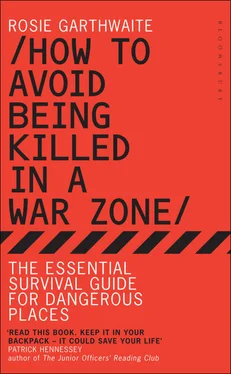Use your least offensive passport, if you have more than one nationality, choosing the best one for your destination. Take the other passports with you, unless they might get you in trouble. In some countries a US or a UK passport could get you killed if found in your luggage, or they might be a ‘Get out of Jail Free’ card in the right hands.
Get visas for neighbouring countries tooif you think you might need to escape quickly.
Make multiple colour photocopies of your documents:passport, ID card (if you have one), driving licence (back and front), insurance papers, emergency numbers (including next of kin) and credit cards (back and front). Keep them in a separate place from the originals. Give copies to your team, your company and friends or family back home.
Pay your bills before you goso that you don’t get stung with a late payment fee or, even worse, have your utilities cut off while you’re away.
Check your credit cards will remain valid throughout your trip, and give your bank a call to let them know you will be travelling so that you don’t get cut off for unusual purchases that look like fraud. They will put a note in the system.
Update your will or write one.I found it quite therapeutic, and others with a family say they found it helped them to sleep better knowing it was written.
Your most important investment when working in a foreign place is in local knowledge. Think about this ahead of time. Who will be your friend and fixer on the ground? Have you done as much groundwork as possible ahead of your visit for making those key connections?
Find a trustworthy and knowledgeable localwho is able and willing to look after you – and do it quickly. To do this you must understand the cultural divisions of the place you are going to. Your fixer has to be from the right part of town if he is going to be able to help you – and in Baghdad, for example, that could change from day to day, so we organized several fixers. We hired four translators – one Shia, two Sunni and one a Christian Kurd. Most of the time they got on, but when things went wrong or events by one side damaged another, we discovered they hated each other more than they hated us, and that was a comfortable position to be in. But you must be aware of the rivalries and jealousies involved in running a team of people who have never worked together before.
By the time I got to Basra I knew I wanted less tension among my helpers, so I chose a man who came from a tribe with mixed religious affiliations – a tribe that always seemed to be in the middle. I didn’t necessarily get everything I needed done as quickly without other key connections, but at least our two-man team didn’t offend people.
Read up about the local cultureand don’t stop until you touch down back at home again. Leith Mushtaq says: ‘Books about the area are a key piece of your kit. You could read something the night before that saves your life.’
You need to think about how you are going to get around the country (see Planes, Trains and Automobiles) and make sure it is sorted from the beginning. Don’t jump into a taxi on the first day only to find out it’s been waiting for someone like you to put their hand up and volunteer for a kidnapping.
Laura McNaught, a freelance film-maker and founder of Sam’s College Fund for children in the developing world, told me about a narrow escape she’d had as a result of too little forethought: ‘It was my first morning in Baghdad. We were getting a lift into the Green Zone with an old Iraqi dude driving a red sports car. He’s chatting merrily with his foot flat down on the gas when I see a Checkpoint – No Entry sign flash past us. I’m about to scream “Stop!” when a series of No Stopping signs whip past the window. Our driver won’t slow down, so in desperation I grab my hair, press pass in hand, and hold it as far out of the tiny back window as I can. We’re greeted by a far from impressed US army officer chastising, “We were about to open fire there, ma’am, if I hadn’t seen your hair…”
‘What I learnt… when Plan A doesn’t work out, an improvised Plan B involving a driver you don’t know is not acceptable. A good driver can save your life; a bad driver can get you killed. Never trust men driving sports cars.’
On the other hand, if you are absolutely certain that taxis are a safe way to travel, save money by using them rather than hiring a car and a driver.
Take a basic book of the local language – the one that most people speak. It needs to show how it is written, not just how it sounds to your ear. That way you can point to phrases or words in the book if local people don’t understand what you are saying. You need to learn how to say your name, your job and where you come from. If you will need to lie because your identity isn’t especially popular in that country, please practise and practise that lie. In Iraq I always said I was Swedish until I realized that many Iraqis had escaped to Sweden under Saddam and I didn’t know my rollmops from my pickled herring. Be careful who you lie to. Get your name, address and next-of-kin phone number written down somewhere in the local language as soon as you get there. And finally, if you have a medical condition, learn its name in the local language and how to ask for a hospital or whatever you need in order to make it better.
Marc DuBois, executive director of MSF–UK, offers some useful advice about getting to grips with the local language: ‘Try to learn a few words as this sets you apart from other strangers. But a word of caution: I was mimicking the language of those around me in one African village. Most of the people there during the day were women, so I was using all the feminine greetings. It didn’t work too well as a 6-foot 3-inch guy.’
This next piece of advice, from Samantha Bolton, former world head of press and campaigns for MSF, has been repeated again and again by people, Muslims and Christians alike: ‘In Islamic areas make sure you know the words of the call to prayer, or at least one other full key paragraph from the Koran. It saved the life of one MSF kidnap victim, a Serbian aid worker from Sarajevo, when she was in Chechnya. She was tied up and about to be shot when she suddenly remembered the call to prayer, which she had heard so many times in her childhood. The kidnappers started arguing about how it was a sign from God and decided not to shoot her. She was eventually released.’
The team you find yourself working with might have been put together by a human resources department who have chosen people for their individual strengths and qualities. On the other hand, it might be made up of a band of brothers and cousins, chosen because someone wanted to keep the money in the family. Or it could have been scrambled together as you were going out the door. There is no guaranteed way of assembling the best team. But there is a lot of groundwork you can do to put your team in the best possible position for working together.
Try to make contact with the rest of your team before you travel.If you get into trouble during your first tentative steps in the country, it is best if they know your name and the sound of your voice rather than just a flight number. And similarly, you need to know their names and who is in charge rather than just an address.
Get to know your team.There will likely be a clash of cultures, not least in the way they work. Some cultures like to work late in the night, leaving time for a three-hour siesta in the afternoon. Others like to have everything wrapped up by 5 p.m. in time for an early dinner and bed. In intense situations there will always be personality clashes, so it is a good idea to have ironed out some of your differences before arriving.
Читать дальше




![Джонатан Димблби - Barbarossa - How Hitler Lost the War [calibre]](/books/385421/dzhonatan-dimblbi-barbarossa-how-hitler-lost-the-w-thumb.webp)







